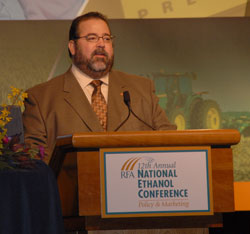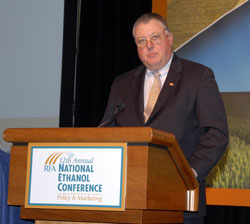 This morning at the National Ethanol Conference we got the view from Capitol Hill as two of our Congressmen provided their thoughts on the legislative agenda for the 110th Congress.
This morning at the National Ethanol Conference we got the view from Capitol Hill as two of our Congressmen provided their thoughts on the legislative agenda for the 110th Congress.
First up was Representative Collin Peterson (D-MN). He serves as Chairman of the House Agriculture Committee.
Peterson started out mentioning the farm bill and the challenges presented by the successes in agriculture, especially in crops like corn. He also talks about how the livestock industry is making its concerns known on the Hill regarding feed costs.
You can listen to his remarks here:  Rep. Collin Peterson Remarks (16 min MP3)
Rep. Collin Peterson Remarks (16 min MP3)


 General Motors is sponsoring a display of flex fuel vehicles here at the conference as I mentioned previously.
General Motors is sponsoring a display of flex fuel vehicles here at the conference as I mentioned previously.  Bobby Rahal, Rahal-Letterman Racing, was our luncheon speaker today.
Bobby Rahal, Rahal-Letterman Racing, was our luncheon speaker today.  Here at the National Ethanol Conference we got some policy information you might find helpful to understand the President’s proposal on alternative fuels. With policy playing such an important role in the growth and development of the ethanol industry it was necessary to get the perspective from one of the government agencies that has a significant role in regulation.
Here at the National Ethanol Conference we got some policy information you might find helpful to understand the President’s proposal on alternative fuels. With policy playing such an important role in the growth and development of the ethanol industry it was necessary to get the perspective from one of the government agencies that has a significant role in regulation. We had a special presentation this morning at the National Ethanol Conference from former U. S. Trade Representative and now partner in the firm of Mayer, Brown, Rowe and Maw LLP, Mickey Kantor.
We had a special presentation this morning at the National Ethanol Conference from former U. S. Trade Representative and now partner in the firm of Mayer, Brown, Rowe and Maw LLP, Mickey Kantor. The Honorable Alexander Karsner, Assistant Secretary of Energy Efficiency and Renewable Energy, U. S. Department of Energy, was the keynote speaker at today’s National Ethanol Conference general session.
The Honorable Alexander Karsner, Assistant Secretary of Energy Efficiency and Renewable Energy, U. S. Department of Energy, was the keynote speaker at today’s National Ethanol Conference general session. Former President Jimmy Carter’s hometown of Plains, Georgia will become the home of a new biodiesel plant.
Former President Jimmy Carter’s hometown of Plains, Georgia will become the home of a new biodiesel plant.  “The development of alternative, environmentally responsible energy sources has been a passion of mine since I became a public servant,” President Carter said. “The production of alternative fuels, such as biodiesel, is a very important step toward energy independence while at the same time being less harmful to the environment and supporting local farmers.”
“The development of alternative, environmentally responsible energy sources has been a passion of mine since I became a public servant,” President Carter said. “The production of alternative fuels, such as biodiesel, is a very important step toward energy independence while at the same time being less harmful to the environment and supporting local farmers.”
 The Reverend of Renewable Fuels and the President/CEO of the Renewable Fuels Association, Bob Dinneen, gave his annual State of the Ethanol Industry speech this morning here at the National Ethanol Conference.
The Reverend of Renewable Fuels and the President/CEO of the Renewable Fuels Association, Bob Dinneen, gave his annual State of the Ethanol Industry speech this morning here at the National Ethanol Conference. The opening general session is in progress here at the National Ethanol Conference. Welcoming everyone was Ron Miller, Chairman of the Renewable Fuels Association.
The opening general session is in progress here at the National Ethanol Conference. Welcoming everyone was Ron Miller, Chairman of the Renewable Fuels Association.